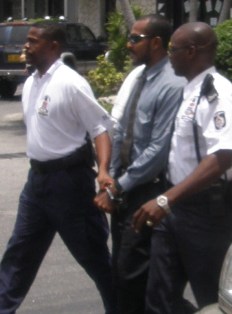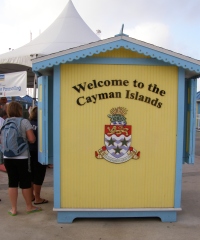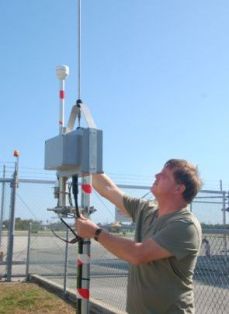Archive for April 6th, 2011

Legal affairs gets to keep advice under wraps
 (CNS): In the most recent decision by the Information Commissioner’s Office (ICO), Acting Commissioner Jan Liebaer has found in favour of the Portfolio of Legal Affairs, which had refused part of a freedom of information request as it said the records were protected on the grounds of professional privilege. The request had asked for any correspondence, including email, memorandums and messages, relating to a criminal prosecution in which the applicant was involved. The requester was granted partial access following an internal review but some records were withheld as the public authority said they fell into both litigation privilege and legal advice privilege.
(CNS): In the most recent decision by the Information Commissioner’s Office (ICO), Acting Commissioner Jan Liebaer has found in favour of the Portfolio of Legal Affairs, which had refused part of a freedom of information request as it said the records were protected on the grounds of professional privilege. The request had asked for any correspondence, including email, memorandums and messages, relating to a criminal prosecution in which the applicant was involved. The requester was granted partial access following an internal review but some records were withheld as the public authority said they fell into both litigation privilege and legal advice privilege.
Legal said the records were created for the dominant purpose of actual litigation as the applicant was before the court charged with a criminal offence. While some of the records were in direct preparation for criminal proceedings, others were communications between legal advisers on the matter. The prosecutors had claimed that a fundamental premise of legal privilege was that counsel must be able to prepare for a trial without the apprehension that their materials will be disclosed to the opposing party.
Although under no obligation to do so, as it is up to the public authority to demonstrate why records shouldn’t be released, the applicant provided a submissions arguing that in order for the privilege to be applied there must be a client-solicitor relationship, which they contended could not be the case within the legal department.
In his analysis the acting commissioner accepted that the dominant purpose of all the records in dispute was to prepare for, advise on, or conduct litigation. He also decided that the communications between legal advisors within the legal department was akin to a client-solicitor relationship in that the client in the criminal matter was “Regina” or “The Crown”.
“It would be inappropriate to contend that the Portfolio of Legal Affairs should, because it is a public authority under the FOI Law, be any less protected by legal professional privilege than a private law firm,” stated Liebaers.
A fundamental premise of FOI is to enable public access to records in order that the public may hold government accountable and better participate in national decision making, not to circumvent other rules, he noted.
“To allow the FOI process to be used to circumvent the normal discovery rules and proceedings of the courts would erode the fundamental concept of legal professional privilege, which clearly applies to the responsive records in this case,” Liebaers said.
Several recent ICO decisions have highlighted procedural weaknesses in the handling of requests and appeals but not on this occasion.While Liebaers revealed that the Portfolio of Legal Affairs declined from participating in the ICO’s mediation process, which is voluntary, the procedural handling of the request was exemplary with no infractions identified.
The Applicant can within 45 days, apply to the Grand Court for a judicial review of the ICO’s tenth decision.
See the full decision below.

Second hand smoke linked to kids’ depression
 (Huffington Post): Children and teens who are exposed to second-hand smoke could be at greater risk of suffering from mental health disorders like depression, anxiety and ADHD, according to a new study that’s among the first to closely examine the potential association between second-hand smoke and mental health. Researchers writing in the Archives of Pediatrics and Adolescent Medicine, looked at nearly 3,000 children, aged 8 to 15. According to the U.S. Surgeon General, more than 60 percent of children between the ages of 3 and 11 are exposed to second-hand smoke.
(Huffington Post): Children and teens who are exposed to second-hand smoke could be at greater risk of suffering from mental health disorders like depression, anxiety and ADHD, according to a new study that’s among the first to closely examine the potential association between second-hand smoke and mental health. Researchers writing in the Archives of Pediatrics and Adolescent Medicine, looked at nearly 3,000 children, aged 8 to 15. According to the U.S. Surgeon General, more than 60 percent of children between the ages of 3 and 11 are exposed to second-hand smoke.

Crown re-opens murder trial
 (CNS): William McLaughlin-Martinez faced trial for the second time for the murder of Brian Rankine-Carter today (Wednesday 6 April). The crown opened its case with a video link to its main witness, Jason Hinds, in Jamaica. Hinds, who pleaded guilty to being an accessory to murder, was given a three year sentence but was released early and deported before McLaughlin’s original 2009 conviction was overturned on appeal. Before a jury of ten women and two men, Hinds recalled the events of the night of the murder in May 2008, when he says McLaughlin-Martinez killed Rankine in a frenzied attack with a machete and another sharp tool.
(CNS): William McLaughlin-Martinez faced trial for the second time for the murder of Brian Rankine-Carter today (Wednesday 6 April). The crown opened its case with a video link to its main witness, Jason Hinds, in Jamaica. Hinds, who pleaded guilty to being an accessory to murder, was given a three year sentence but was released early and deported before McLaughlin’s original 2009 conviction was overturned on appeal. Before a jury of ten women and two men, Hinds recalled the events of the night of the murder in May 2008, when he says McLaughlin-Martinez killed Rankine in a frenzied attack with a machete and another sharp tool.
Telling his version of events for the second time the crown witness told how he and Martinez had met Rankine at the eastern star bar in east end and how he had agreed todrive them into George Town in his company work van.
Describing what wasbelieved to be a drug deal that had gone wrong, Hinds said that when they arrived in George Town, Martinez attacked Rankine, chopping him with the machete in what felt "Like a nightmare. He said he had tried to stop Martinez by pulling him off Rankine but he failed and when he felt a tool in Rankine’s hand he went back to the van in fear.
He told the court how he drove Martinez to various locations to dispose of the victim’s clothes and possessions, as well as the murder weapon before he took him home.
The two men were arrested the next morning after witnesses reported seeing the van shortly before they found the naked mutilated body of Rankine in McField Lane, George Town.
According to the crown, Hinds gave a full account to police soon after his arrest, saying that Martinez was the killer and he had helped him dispose of the evidence. Solicitor General Cheryl Richards told the jury that other witnesses and evidence would be presented during the trial that supported Hinds’ account.
Mark Tomassi, Martinez’ attorney, is expected to cross examine Hinds this afternoon and will present the defense position that Hinds, not his client, was the murderer.

Port tenants form group ahead of cruise pier project
 (CNS): Port Authority tenants at the Royal Watler Terminal are pulling together to protect their interests in the face of the proposed cruise berthing facilities. Retailers doing business there have formed the RWT Association to “promote and protect the commercial services that they offer”, the chair of the group, Kevin Doyle from Island Restaurants, said. Although the group of ten business owners says it is still too early to say how they will be impacted during the development of the piers, they suspect that there is likely to be at least some downtime as they are constructed. As the move to redevelopment comes closer, the owners said operating as one body rather than individually would be in their interests.
(CNS): Port Authority tenants at the Royal Watler Terminal are pulling together to protect their interests in the face of the proposed cruise berthing facilities. Retailers doing business there have formed the RWT Association to “promote and protect the commercial services that they offer”, the chair of the group, Kevin Doyle from Island Restaurants, said. Although the group of ten business owners says it is still too early to say how they will be impacted during the development of the piers, they suspect that there is likely to be at least some downtime as they are constructed. As the move to redevelopment comes closer, the owners said operating as one body rather than individually would be in their interests.
“With the potential of construction of a new pier disrupting traffic flow at Royal Watler, we want to ensure that our business interests are represented,” said Doyle. “Our aim isto foster and enhance good relations with the board and staff of the Port Authority and hope to gain representation on their board. We all share mutual interests in the successful expansion of the new pier.”
He added that once the formal development agreement is executed, the association will meet with the new developer and the board of the Port Authority regarding the implementation of the new design and plans.
“It is too early to say whether the tenants’ businesses will be adversely affected by disruptions as the new piers and facilities are built-out but we suspect that there is likely to be at least some downtime and subsequent reduction in business,” Doyle said. Although the designs for the new cruise port have not yet been finalised he believes the RWT will survive in the new upland development.
“We understand that the existing main commercial building, where the shops currently are, is likely to remain in operation,” he added, so the majority of the RWT Association members are likely to continue. “However we understand that the kiosks, from which a few of our members operate, will be moved.”
Doyle said that the RWT would like to have one of its members appointed to the Port Authority Board to strengthen the communication bridge between the board and its tenants. At the very least, Doyle said the association hopes to have a member attend the meetings.
While the port development is a key factor for the business at the Royal Watler, Doyle also said the association was formedto promote a number of other issues, such as ensuring that tenants’ staff and management apply a professional, courteous and high standard of behaviour to visitors while maintaining well run businesses and quality premises. The tenants would also like to improve communication with the board on other issues, such as security or threats to the welfare of any members and other issues relating to them collectively as tenants of the government authority.
Travers makes a come-back with new verbal attack
(CNS): Although Anthony Travers is no longer the chair of the offshore sector’s industry body, he is still pulling no punches when it comes to media reports about the Cayman Islands which he says are incorrect. Hitting out at an article in Tuesday’s edition of the Financial Times by Nicholas Shaxson and John Christensen suggesting Cayman is one of four offshore centre which received the largest amount of illicit international funds, Travers returns to form with his verbal attacks. The newspaper, he said, should be ashamed for allowing itself to be used by “desperate ill-informed malcontents”, whom he describes as “left wing social engineers” in a statement Wednesday morning.
Having previously called Nicholas Shaxson, the author of Treasure Islands and an associate fellow of Chatham House, an imbecile, this time Travers says he and John Christensen, the authors of "Time to black-list the tax haven whitewash", are extreme left wing social engineers. The chair of the Cayman Islands Stock Exchange describes the Tax Justice Network, of which Christensen is a member, as an organisation dedicated to the destruction of offshore financial centres and committed to high global levels of taxation and says the editors at the FT should be ashamed for giving the men space in the paper.
“In the interests of providing factual and objective information to which FT readers are normally accustomed, considerably fewer column inches should be attributed to the delusional rantings of those extreme left wing social engineers Messrs Christensen and Shaxson,” Travers said in his statement, reminiscent of the verbal punches he threw when he was chair of Cayman Finance.
“It is difficult to discern a thread of reason in their rant other than that this type of deliberate misstatement is the weapon of choice of the class warrior i.e. smear, mischaracterize and hope to live another day before the reasoned and factual refutation gains traction.”
He said that while such tactics of “the desperate” were understandable, the reason why the Financial Times should be a willing accomplice was less so.
“The evidence in respect of money laundering is clear,” Travers added, echoing the message he delivered regularly when he was chair of Cayman Finance. “Abacha – $4billion through the City of London; Mogilevich – $7b through Bankers Trust in New York; 400,000 IRS enquiries of UBS in Switzerland that bastion of the distinction between tax evasion and tax fraud and now Wachovia applying no due diligence whatsoever and fined $180m for laundering $378b from Mexican drug lords through Miami.”
He pointed to what he said was first class and “evidently highly effective anti-money laundering legislation and world-leading tax transparency already demonstrates the transparency which this laughably ill-informed pair of malcontents demand be introduced.”
Although Travers said the article was entertaining, he said it was better suited to the Comics Section of The Financial Times. “This is not the first time that the FT has misled its readers over the Cayman Islands and one wonders why they can bring journalistic excellence and accuracy to reporting the City of London or Wall Street but show utter ignorance and contempt for a small country such as Cayman. "It is irresponsible and reprehensible. Their editors should be ashamed,” he added.
Travers made his sudden departure from the local industry body in February after being its spokesman for more than two years, during which time he directly rebutted critics of Cayman at every opportunity. Roy McTaggart was appointed interim chair.
McTaggart said at the time he would be continuing the work started by Travers until a committee of the organisation’s members could find a new figurehead for the association. Since then McTaggart has made just one piece of correspondence public in which he rebutted a slight about the jurisdiction. The letter was to Ronnie Campbell, MP, a UK parliamentarian who referred to the Cayman Islands as a tax haven during a debate in the House of Commons. Although, Cayman Finance may be continuing its work behind closed doors, it has made no other public statements.
See FT article Time to black-list the tax haven whitewash

CAL to inspect two Boeing aircraft
 (CNS): In the wake of an industry service order concerning aircraft inspection, Cayman’s national flag carrier says the bulletin is only applicable to two of its four Boeing 737-300 aircraft, and that inspections will be conducted on those planes well ahead of the required inspection timeline. The call comes following the incident involving Southwest Airlines in which a five foot opening developed in the fuselage of a Boeing B737-300 during a flight from Phoenix Arizona to Sacramento, California, on 1 April. The aircraft manufacturer has now stated that the planes need to be inspected before completing 30,000 flights rather than 60,000 as previously advised.
(CNS): In the wake of an industry service order concerning aircraft inspection, Cayman’s national flag carrier says the bulletin is only applicable to two of its four Boeing 737-300 aircraft, and that inspections will be conducted on those planes well ahead of the required inspection timeline. The call comes following the incident involving Southwest Airlines in which a five foot opening developed in the fuselage of a Boeing B737-300 during a flight from Phoenix Arizona to Sacramento, California, on 1 April. The aircraft manufacturer has now stated that the planes need to be inspected before completing 30,000 flights rather than 60,000 as previously advised.
Cayman Airways CEO Fabian Whorms explained that because Cayman Airways’ aircraft have accumulated a low number of flight cycles (one take off-one landing) one aircraft requires inspection within 20 months and the other in 28 months, and that the Boeing Service Bulletin will be complied with well ahead of the required timeline when the two aircraft undergo scheduled heavy maintenance early in 2012.
The airline said that in addition to the its scheduled plan to meet the mandatory requirements early, Cayman Airways is currently conducting detailed visual inspections of its own in the defined areas on all four of its B737-300 aircraft as an added precautionary measure to supplement the mandated Boeing inspections.
“As always, Cayman Airways takes pride in upholding the highest standards of safety and security for our passengers and we are highly committed to maintaining constant compliance with all regulatory requirements,” he said.
Whorms added that the airline’s B737-300 aircraft are maintained to meet several applicable Manufacturer and Regulatory requirements, including those of the British Overseas Territories, the Civil Aviation Authority of the Cayman Islands (CAACI ), the United States Federal Aviation Administration (FAA), and Boeing.
Boeing said yesterday that its engineering and safety experts were caught off guard by the midair rupture in the fuselage of the Southwest Airlines jet. A senior company engineer said the five-foot tear in the aluminum skin of the 15-year-old Boeing 737 aircraft had led to the rapid decompression of the passenger cabin while the plane was cruising at 36,000 feet, but no one was seriously injured.
Boeing believed that older versions of its 737 could face serious cracking problems but didn’t think the risk would arise so early in their careers and had previously advised planes could make 60,000 flights before they needed to undergo inspections.
“Boeing’s engineering assumptions weren’t nearly as accurate as they thought, or as they should have been,” said Mark Rosenker, a former chairman of the National Transportation Safety Board, which is investigating the incident.

Gadget can record if lightning strikes twice
 (CNS): Local weather experts have a new gadget with which they can measure the frequency of lightning, which they say will not only improve weather forecasting but also safety at the airport. The long-range lightning detection system, which was funded by the UK, now links the Cayman Islands National Weather Service (CINWS) to the UK’s detection grid, and if lightning does strike twice in the same place the gadget will know. The system, which is now installed and being tested, is capable of detecting lightning generated anywhere in the Caribbean. CINWS Director General Fred Sambula said it would reveal intensity as well as frequency of lightning all over the region.
(CNS): Local weather experts have a new gadget with which they can measure the frequency of lightning, which they say will not only improve weather forecasting but also safety at the airport. The long-range lightning detection system, which was funded by the UK, now links the Cayman Islands National Weather Service (CINWS) to the UK’s detection grid, and if lightning does strike twice in the same place the gadget will know. The system, which is now installed and being tested, is capable of detecting lightning generated anywhere in the Caribbean. CINWS Director General Fred Sambula said it would reveal intensity as well as frequency of lightning all over the region.
“We are very pleased to have the system up and running,” he said. “Once fully commissioned, we should be able to see where lightning is more intense in the immediate vicinity as well as the whole Caribbean region. This will boost safety in airport and aircraft operations.” He added that the system improves weather forecasting by providing data on lightning frequency and intensity in all weather conditions.
UK Met Office Engineer Bernie Ryley led the installation on the CINWS grounds on Owen Roberts Drive of the antenna and the sophisticated computer unit inside that is linked to the UK Met’s headquarters in Exeter, England. Ryley was assisted by Kenneth Maxwell of the Cayman Islands Airport Authority in setting up the complex electronics unit.
Head of the Governor’s Office, Steve Moore, said he was delighted that the UK Met office could help withenhancing weather forecasting as well as airport and aircraft safety management systems in Cayman. “The Cayman Islands is now geared up to be part of a global lightning detection network.”